
Andean Geology
Scope & Guideline
Uncovering the Secrets Beneath the Andes
Introduction
Aims and Scopes
- Geological Mapping and Remote Sensing:
The journal emphasizes geological mapping and the use of remote sensing technologies, such as ASTER images, to analyze geological features and processes in the Andean region. - Volcanology and Geothermal Studies:
A significant focus on volcanic activity, impacts, and geothermal energy exploration, particularly in relation to the Southern Andes and the associated geological heritage. - Paleontology and Stratigraphy:
Research in this journal often includes paleontological studies and stratigraphic analyses, providing insights into the geological history and evolutionary biology of the region. - Sedimentology and Tectonics:
The journal covers sedimentological studies and tectonic processes, exploring how these factors shape the Andean landscape and influence natural resource distribution. - Geological Heritage and Environmental Implications:
A core area of interest is the assessment of geological heritage sites and their environmental implications, highlighting the intersection of geology and societal impacts.
Trending and Emerging
- Geological Impacts of Climate Change:
There is an increasing focus on how climate change affects geological processes, such as glacier fluctuations and sedimentary dynamics, underscoring the importance of integrating environmental studies with geology. - Interdisciplinary Approaches to Volcanology:
Emerging studies are increasingly interdisciplinary, combining arts, social sciences, and geology to understand the societal impacts of volcanic activity and enhance community resilience. - Sustainable Resource Management:
Research is trending towards the implications of geological studies for sustainable resource management, including energy transition discussions around potential graphite sources and lithium exploration. - Advanced Geochemical and Isotopic Analyses:
There is a growing trend in utilizing advanced geochemical and isotopic techniques for understanding geological history and resource potential, reflecting advancements in analytical methodologies. - Geological Heritage and Conservation:
An increasing emphasis on the assessment and conservation of geological heritage sites is evident, reflecting a broader societal interest in preserving geological features for future generations.
Declining or Waning
- Historical Geological Studies:
There has been a noticeable reduction in publications focusing on historical geological studies, possibly due to a shift towards more contemporary geological issues and applied research. - Traditional Mineral Exploration:
Research centered on traditional mineral exploration methods appears to be waning, as the focus shifts toward more advanced geochemical and geophysical techniques. - Non-Volcanic Geological Phenomena:
Topics related to non-volcanic geological phenomena, such as sedimentary processes unrelated to volcanic activity, have seen a decrease, indicating a growing interest in volcanic and geothermal contexts.
Similar Journals

JOURNAL OF IBERIAN GEOLOGY
Advancing geological knowledge of the Iberian Peninsula.JOURNAL OF IBERIAN GEOLOGY, published by Springer International Publishing AG, is a pivotal platform dedicated to advancing the field of geology and stratigraphy. With an ISSN of 1698-6180 and E-ISSN of 1886-7995, this journal has earned its reputation in the academic community, holding a commendable Q2 ranking in both Geology and Stratigraphy for 2023, reflecting its contributions to contemporary geological research. Spanning from 2007 to 2024, it provides a comprehensive forum for scholars and practitioners from around the globe to disseminate their findings pertaining to the Iberian Peninsula, enhancing the understanding of regional geological phenomena. The journal has carved out a significant niche within the Earth and Planetary Sciences, ranking #137 out of 321 in Geology and #24 out of 55 in Stratigraphy, indicating its wide-reaching impact and scholarly engagement. The Journal of Iberian Geology serves as an indispensable resource for those interested in the complexities of geological structures, stratigraphic sequences, and the broader implications of geological research, making it a vital reference for researchers, professionals, and students alike.

China Geology
Your Gateway to Cutting-Edge Geological ResearchChina Geology, published by KEAI PUBLISHING LTD, is a leading open-access journal that serves as a pivotal platform for disseminating high-quality research across a wide spectrum of Earth sciences. Since its inception in 2018, the journal has rapidly established itself with an impressive Q1 ranking in multiple critical categories, including Geology, Economic Geology, and Oceanography, among others, reflecting its significant contribution to the academic community. Positioned as a top-tier journal in the Earth Planetary Sciences domain, it ranks #22 out of 321 in Geology and exhibits an admirable impact in sub-fields such as Earth-Surface Processes and Geochemistry and Petrology. China Geology is committed to promoting rigorous scientific inquiry and facilitating the open exchange of knowledge in the geosciences, making it an essential resource for researchers, professionals, and students eager to explore innovative developments and fundamental advances in geology. The journal’s accessibility ensures that critical findings reach a broad audience, thereby enhancing collaboration and driving forward scientific discourse in the global community.
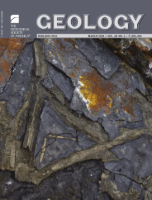
GEOLOGY
Pioneering Insights in Geology and Earth SciencesGEOLOGY, published by the Geological Society of America, Inc, is a premier journal dedicated to advancing knowledge, research, and discussion in the field of geology. With an ISSN of 0091-7613 and an E-ISSN of 1943-2682, this journal stands out with an impressive Q1 ranking in Geology for 2023, positioning it among the top journals in the realm of Earth and Planetary Sciences, specifically holding a remarkable rank of 11 out of 321, reflecting its 96th percentile status. This journal aims to publish innovative research articles that cover all aspects of geology, from tectonics and sedimentology to paleontology and mineralogy, offering invaluable insights for researchers, professionals, and students alike. Although not currently open access, GEOLOGY maintains a rigorous review process ensuring the quality and integrity of the research it publishes. For more than five decades, spanning from its inception in 1973 to the upcoming publications in 2024, GEOLOGY has been instrumental in shaping the geological discourse and continues to be a vital resource for the scientific community.
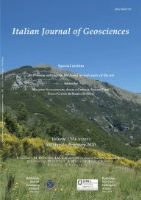
Italian Journal of Geosciences
Transforming Knowledge: Open Access to Earth Science BreakthroughsItalian Journal of Geosciences, published by the Società Geologica Italiana, is a distinguished platform for the dissemination of research in the fields of Earth and Planetary Sciences and Geology. With an impressive impact factor reflected in its 2023 rankings, where it placed in the Q3 category across its related fields, this journal serves as a vital resource for academics, practitioners, and students. Established in 2010 and poised to continue until 2024, the journal showcases critical advancements and interdisciplinary studies that deepen our understanding of geological processes and Earth systems. Operating under open access options, it offers robust accessibility to a broad audience, facilitating wider dissemination of knowledge. The journal's affiliation with Università degli Studi La Sapienza in Rome, Italy, further underscores its commitment to academic excellence and innovation in geosciences.
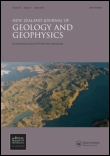
NEW ZEALAND JOURNAL OF GEOLOGY AND GEOPHYSICS
Deepening Understanding of Earth's Dynamic Systems.NEW ZEALAND JOURNAL OF GEOLOGY AND GEOPHYSICS, published by Taylor & Francis Ltd, stands as a prominent forum dedicated to the interdisciplinary exploration of geological and geophysical phenomena. With an impact factor that situates this journal in the prestigious Q1 category across key subjects—namely Earth and Planetary Sciences, Geology, and Geophysics—it is a critical resource for researchers, professionals, and students alike. The journal has been operational since 1958 and continues to contribute valuable insights into the complexities of the Earth's processes. Although it does not currently offer Open Access options, its broad readership benefits from an extensive archive of high-quality research findings that span from 1958 to 2024. Located in the United Kingdom, the journal remains a pivotal player in advancing the understanding of Earth's systems, making significant contributions to both academic inquiry and practical applications in the field.
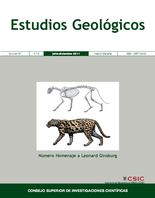
ESTUDIOS GEOLOGICOS-MADRID
Advancing Geoscience Knowledge Through Open Access.ESTUDIOS GEOLOGICOS-MADRID is a prominent journal in the field of geology, published by the esteemed Consejo Superior de Investigaciones Científicas (CSIC) in Spain. Established in 1976, this Open Access journal has been a vital resource for researchers and professionals since its inception. With an impact factor reflecting its contribution to the Earth and Planetary Sciences community, ESTUDIOS GEOLOGICOS-MADRID currently holds a Q3 category ranking in Geology as of 2023, showcasing its relevance and quality within the discipline. The journal publishes a diverse array of geological studies, ensuring wide-reaching access to significant research findings, thereby promoting collaboration and knowledge sharing. Established as a platform for both foundational research and applied geology, this journal fosters academic growth and contributes to understanding the Earth’s processes. Researchers, professionals, and students are encouraged to explore its extensive archive, which includes publications from 1976 to the present. For more information, visit the journal's editorial office at Editorial CSIC, C/VITRUVIO 8, 28006 MADRID, SPAIN.

Geological Field Trips and Maps
Navigating Geology: Where Research Meets Real-World ApplicationGeological Field Trips and Maps is a pivotal journal published by IST SUPERIORE PROTEZIONE & RICERCA AMBIENTALE-ISPRA in Italy, dedicated to advancing the field of geological sciences through practical applications and systematic exploration. The journal, which operates under the ISSN 2611-6189, focuses on providing valuable insights through geological maps and field trip reports, enriching both academic research and practical understanding of geology. Despite not having an Open Access option, it presents an opportunity for researchers and professionals to engage with peer-reviewed content that navigates through essential topics such as economic geology, stratigraphy, and planetary change, where it holds respectable quartile rankings, including Q3 in Economic Geology and Q4 in Global and Planetary Change as of 2023. Between 2018 and 2024, this journal aims to foster collaboration and knowledge-sharing among geologists, making it an invaluable resource for anyone vested in the exploration of Earth's complex systems.
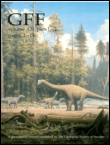
GFF
Innovative Discoveries in Geology and Paleontology Await.GFF is a prestigious academic journal dedicated to advancing research in the fields of Geology and Paleontology. Published by Taylor & Francis Ltd in the United Kingdom, GFF serves as a vital platform for disseminating innovative findings and fostering discussions among researchers, professionals, and students alike. With a noteworthy impact factor reflecting its significance in the scientific community, GFF has achieved Q2 ranking in both Geology and Paleontology, underscoring its commitment to high-quality scholarship. The journal has been operational since 1872, accumulating a rich history of contributing to our understanding of earth sciences. It currently ranks #133 out of 321 in Earth and Planetary Sciences - Geology, and #50 out of 113 in Paleontology according to Scopus rankings. Although it does not offer an open access option, GFF remains accessible through various academic databases, ensuring that cutting-edge research reaches a wide audience. Its comprehensive scope aims to explore critical advancements in geological and paleontological sciences, making it an essential resource for those committed to exploring the intricacies of our planet’s past and present.

NORWEGIAN JOURNAL OF GEOLOGY
Uncovering Geological Insights for a Sustainable Future.NORWEGIAN JOURNAL OF GEOLOGY, published by the Geological Society of Norway, stands as a vital resource in the fields of geology, geochemistry, petrology, geophysics, oceanography, and paleontology. Since its transition to an Open Access model in 2015, this journal has significantly expanded its reach, allowing for greater dissemination of cutting-edge research and insights. With an ISSN of 2387-5844 and E-ISSN of 2387-5852, the journal is committed to fostering collaboration and knowledge exchange among the scientific community. The journal's categorization in the Q3 quartile across various Earth and Planetary Sciences fields underscores its status as a reputable publication, offering researchers, professionals, and students alike a platform to share their findings and advancements in geology. Continuing through its converged years from 2015 to 2024, the NORWEGIAN JOURNAL OF GEOLOGY plays a crucial role in enhancing our understanding of Earth's processes and materials, making it an important reference for anyone engaged in geoscientific research.

GEOLOGICA ACTA
Exploring the depths of geology with global insights.GEOLOGICA ACTA is a distinguished open-access journal dedicated to the field of geology, published by Universitat de Barcelona since its inception in 2003. With an impact factor that reflects its relevance in the academic community and a commendable Q2 ranking within the Earth and Planetary Sciences category, this journal is committed to disseminating high-quality research that spans various aspects of geological sciences. The journal's broad scope encompasses both theoretical and applied research, making it a vital platform for researchers, professionals, and students alike to share their findings with a global audience. With its Open Access policy, GEOLOGICA ACTA ensures that all published articles are freely accessible, fostering collaboration and innovation in the geological community. Based in Barcelona, Spain, at the Geociences Barcelona (CSIC), it plays a pivotal role in connecting scholars from diverse backgrounds and advancing the field of geology through rigorous peer-reviewed articles.